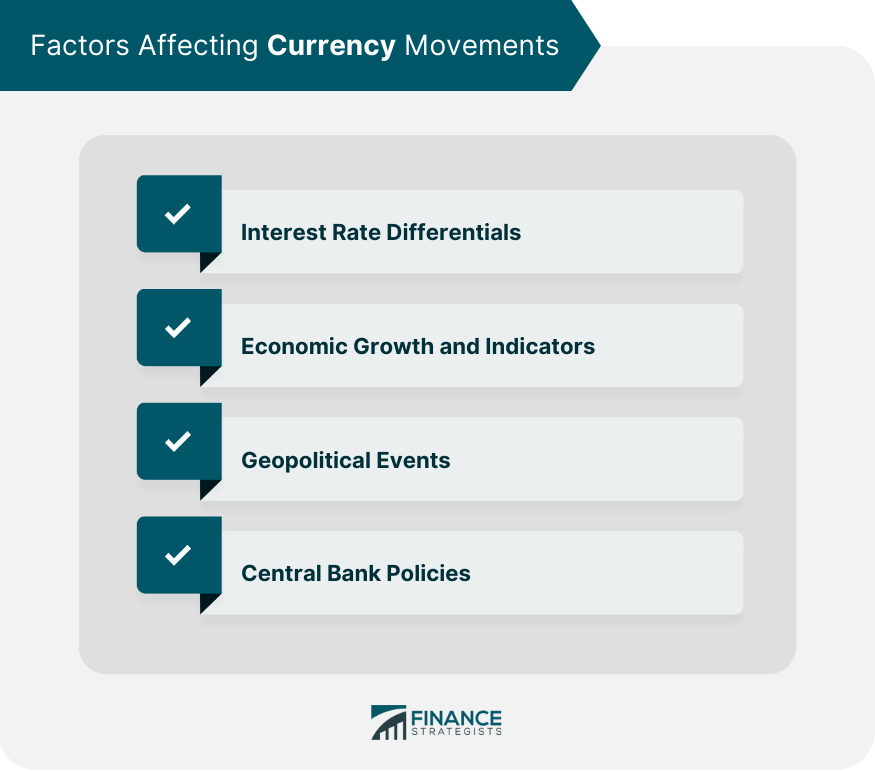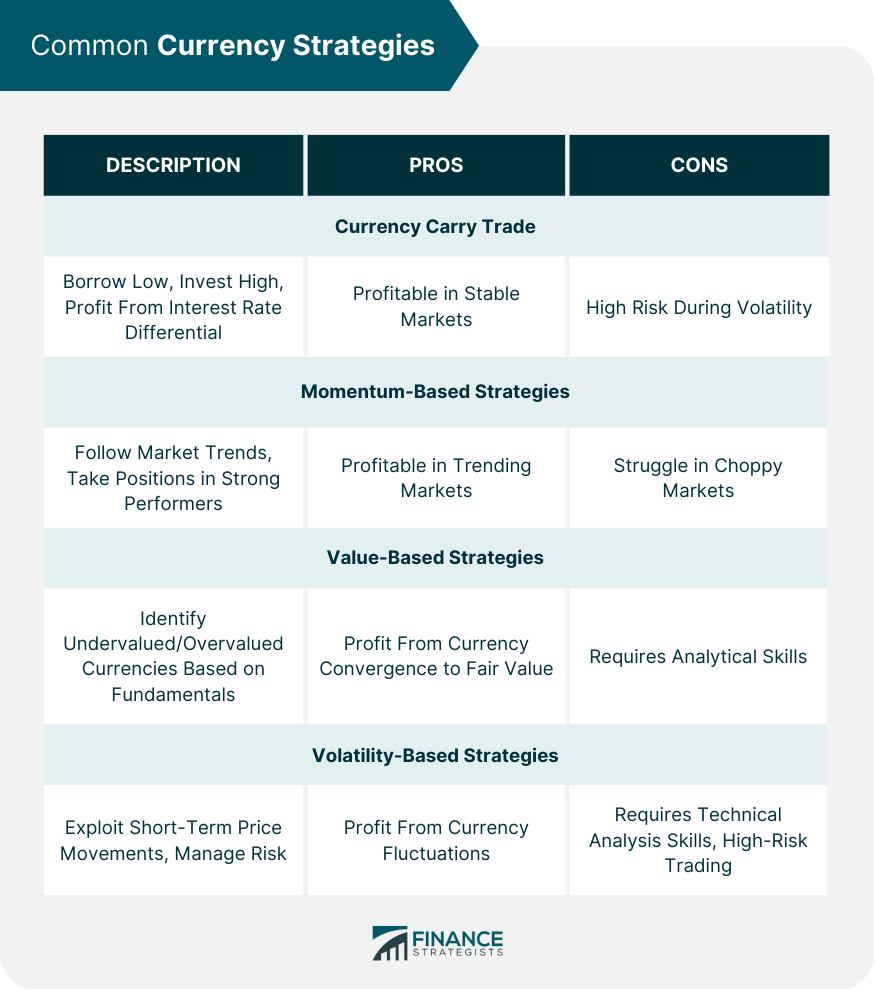Currency strategies refer to various approaches investors and traders employ to capitalize on opportunities or manage risks in the foreign exchange market. These strategies can range from simple to complex, aiming to profit from currency movements or hedge against adverse currency fluctuations. Currency strategies play a critical role in international investing as they help investors manage currency risk, enhance returns, and protect their global portfolios. Understanding and employing effective currency strategies can lead to better investment decisions and improved portfolio performance. Investors can use several currency strategies, including currency carry trade, momentum-based, value-based, and volatility-based strategies. Each strategy has its unique set of advantages and risks, and investors need to choose the appropriate approach based on their risk tolerance, investment goals, and market conditions. Interest rate differentials refer to the difference in interest rates between two countries. They play a significant role in currency movements, as higher interest rates tend to attract capital inflows, leading to currency appreciation, while lower interest rates often result in currency depreciation. Economic growth and various economic indicators, such as GDP, inflation, and employment data, can influence currency movements. Strong economic growth and positive economic indicators generally result in currency appreciation, while weak growth and negative indicators can lead to currency depreciation. Geopolitical events, such as elections, conflicts, and trade disputes, can have a significant impact on currency movements. These events can create uncertainty and affect investor sentiment, leading to fluctuations in currency values. Central bank policies, including monetary policy decisions and interventions in the foreign exchange market, can significantly influence currency movements. Actions such as interest rate changes, quantitative easing, and currency interventions can lead to shifts in currency values. Currency carries trade is a strategy where investors borrow in a low-interest-rate currency and invest in a high-interest-rate currency, aiming to profit from the interest rate differential. This strategy can be profitable in stable market conditions but may involve significant risks during periods of high volatility. Momentum-based currency strategies involve following existing market trends and taking positions in currencies that have shown strong recent performance. These strategies assume that current trends will continue and can generate profits in trending markets but may struggle in range-bound or choppy markets. Value-based currency strategies focus on identifying undervalued or overvalued currencies based on fundamental analysis, such as economic indicators, interest rates, and inflation data. Investors employing this strategy aim to profit from the eventual convergence of currency values to their fair value. Volatility-based currency strategies seek to profit from fluctuations in currency prices by exploiting short-term price movements. These strategies often involve the use of technical analysis, chart patterns, and other tools to identify potential trading opportunities and manage risk. Currency hedging is the process of reducing or eliminating currency risk in international investments by taking offsetting positions in the foreign exchange market. This strategy helps protect investors from adverse currency movements and can enhance the stability of investment returns. Forward contracts are agreements between two parties to exchange a predetermined amount of one currency for another at a specified exchange rate on a future date. They are commonly used to hedge currency risk in international investments and trade transactions. Currency options give investors the right, but not the obligation, to buy or sell a specified amount of one currency for another at a predetermined exchange rate on or before a specific date. Options provide a flexible means of hedging currency risk and can be tailored to meet the specific needs of investors. Currency exchange-traded funds (ETFs) and exchange-traded notes (ETNs) are financial instruments that track the performance of a specific currency or a basket of currencies. They provide investors a convenient way to hedge currency risk in their portfolios without directly participating in the foreign exchange market. Currency hedging should be considered when an investor has significant exposure to foreign currency risk, which can arise from international investments, trade transactions, or business operations. The decision to hedge depends on factors such as the investor's risk tolerance, investment objectives, and market outlook. Implementing currency hedging can help protect against adverse currency movements and stabilize investment returns. Active currency management involves taking deliberate positions in the foreign exchange market based on various factors, such as economic indicators, technical analysis, and market sentiment. Active strategies aim to capitalize on currency movements and generate excess returns compared to a passive approach or a benchmark. Passive currency management typically involves minimizing currency risk by implementing a hedge or maintaining a diversified portfolio without actively seeking to profit from currency movements. Passive strategies may be appropriate for investors who prioritize risk reduction or have limited resources for active management. When selecting a currency strategy, investors should consider factors such as their investment objectives, risk tolerance, time horizon, and available resources. Other considerations include the investor's familiarity with the foreign exchange market, expected market conditions, and the potential impact of currency movements on their portfolio. Currency risk, also known as exchange rate risk, refers to the potential for losses due to fluctuations in exchange rates. International investors and businesses with operations in multiple countries are exposed to currency risk, which can affect their investment returns and financial performance. Diversification across currencies can help mitigate currency risk by spreading exposure across multiple currencies, reducing the impact of adverse movements in any single currency. This strategy can help improve portfolio stability and potentially enhance long-term investment returns. Managing currency risk in a global investment portfolio involves employing strategies such as currency hedging, diversification, and selecting appropriate active or passive currency management approaches. By effectively managing currency risk, investors can protect their portfolios from adverse currency movements and enhance overall performance. Global macro strategies are investment approaches that seek to profit from macroeconomic trends and global events. These strategies often involve taking positions in various asset classes, including currencies, based on factors such as economic indicators, geopolitical events, and interest rate differentials. Currency strategies play a crucial role in global macro investing, as currency movements can significantly impact investment returns and portfolio risk. By employing appropriate currency strategies, global macro investors can capitalize on opportunities arising from currency fluctuations and manage associated risks. When incorporating currency strategies into global macro investing, investors should evaluate the potential performance and risk implications. Understanding various currency strategies' historical performance, potential return, and risk characteristics can help investors make informed decisions and enhance their global macro investment outcomes. Performance measurement is essential for assessing the effectiveness of currency strategies. Key metrics to consider include absolute and risk-adjusted returns, consistency of performance, and comparison against relevant benchmarks or peer groups. Risk assessment involves evaluating the potential risks associated with currency strategies, including market, credit, and liquidity risks. Understanding the risk profile of a currency strategy can help investors make informed decisions and manage their overall portfolio risk. Benchmarking and comparison involve evaluating the performance of a currency strategy against relevant indices or other strategies. This process can provide valuable insights into the effectiveness of the strategy and help identify areas for improvement or adjustment. Currency strategies play a vital role in international investing and portfolio management, helping investors capitalize on opportunities and manage risks in the foreign exchange market. Investors can make more informed decisions and enhance their investment outcomes by understanding various currency strategies, such as carry trade, momentum-based strategies, and hedging. Understanding currency risks and strategies is essential for international investors and businesses operating in multiple countries. By effectively managing currency risk, investors can protect their portfolios from adverse currency movements, enhance overall performance, and achieve their investment objectives. Currency strategies play a critical role in international investing and portfolio management, as they can help investors navigate the complexities of the foreign exchange market and manage currency risks. By employing appropriate currency strategies, investors can improve the stability of their global portfolios, capitalize on opportunities arising from currency fluctuations, and potentially enhance long-term investment returns. Navigating the complexities of currency strategies and managing currency risks can be challenging for many investors. To ensure you effectively manage your global investment portfolio, consider seeking the guidance of professional wealth management services. By partnering with wealth management experts, you can access tailored advice, benefit from their extensive experience and knowledge, and optimize your currency strategies to meet your specific investment goals. What Are Currency Strategies?
Factors Affecting Currency Movements

Interest Rate Differentials
Economic Growth and Indicators
Geopolitical Events
Central Bank Policies
Common Currency Strategies
Currency Carry Trade
Momentum-Based Strategies
Value-Based Strategies
Volatility-Based Strategies

Currency Hedging
Methods of Currency Hedging
Forward Contracts
Options
Currency ETFs and ETNs
When to Implement Currency Hedging
Active vs Passive Currency Strategies
Active Currency Management
Passive Currency Management
Factors to Consider When Choosing a Currency Strategy
Currency Risk and Diversification
Understanding Currency Risk
Diversification Across Currencies
Managing Currency Risk in a Global Investment Portfolio
Role of Currency Strategies in Global Macro Investing
Global Macro Strategies
Currency Strategies in Global Macro Investing
Performance and Risk Considerations
Evaluating Currency Strategies
Performance Measurement
Risk Assessment
Benchmarking and Comparison
Final Thoughts
Currency Strategies FAQs
Currency strategies refer to approaches investors and traders use to profit from or manage risks in the foreign exchange market. These strategies play a crucial role in international investing as they help investors manage currency risk, enhance returns, and protect their global portfolios.
Interest rate differentials, economic growth and indicators, geopolitical events, and central bank policies are factors that can influence currency movements. Understanding these factors is essential for developing effective currency strategies.
Currency carry trade, momentum-based, value-based, and volatility-based strategies are some common currency strategies. Each strategy has its unique set of advantages and risks, and investors need to choose the appropriate approach based on their risk tolerance, investment goals, and market conditions.
Currency hedging is the process of reducing or eliminating currency risk in international investments by taking offsetting positions in the foreign exchange market. It should be considered when an investor has significant exposure to foreign currency risk, which can arise from international investments, trade transactions, or business operations.
Investors should consider their investment objectives, risk tolerance, time horizon, available resources, familiarity with the foreign exchange market, expected market conditions, and the potential impact of currency movements on their portfolio when selecting a currency strategy.
True Tamplin is a published author, public speaker, CEO of UpDigital, and founder of Finance Strategists.
True is a Certified Educator in Personal Finance (CEPF®), author of The Handy Financial Ratios Guide, a member of the Society for Advancing Business Editing and Writing, contributes to his financial education site, Finance Strategists, and has spoken to various financial communities such as the CFA Institute, as well as university students like his Alma mater, Biola University, where he received a bachelor of science in business and data analytics.
To learn more about True, visit his personal website or view his author profiles on Amazon, Nasdaq and Forbes.















